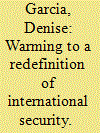| Srl | Item |
| 1 |
ID:
153242


|
|
|
|
|
| Summary/Abstract |
The aim of this article is to interpret Tokyo's pivotal role in the Kyoto Protocol negotiations as a practice of reconstructing Japan's identity of an ‘international’ and ‘independent’ country. The text bases this argument in poststructural national identity scholarship, which believes that discursive differentiation to international forces (‘others’) plays a decisive role in formulating state's identity. For most parts of the post-war history, United States served as the most significant other for Japan's self construction. Japan narrated itself as a ‘weak’ and ‘subservient’ country dominated by the ‘dominant’ West. This narrative, however, has been significantly altered after the dissolution of the Soviet Union. Japan's identity entrepreneurs began describing Japan as an ‘independent’ or ‘normal’ country, one that proactively contributes to world affairs. Tokyo's legitimization of the Kyoto Protocol was in line with this identity reconstruction. The image of a proactive environmental leader created a symbol of Kyoto that overshadowed the opponents of the Protocol, and lead Japan to ratify it albeit the United States chose to withdraw from it. Once the ratification was over, however, the practical implementation failed to comply with Japan's symbolic commitment.
|
|
|
|
|
|
|
|
|
|
|
|
|
|
|
|
| 2 |
ID:
099796


|
|
|
|
|
| Publication |
2010.
|
| Summary/Abstract |
The fundamental idea of this article is that the enormity and nature of the challenges created by climate change are redefining the understanding and definition of international security. The threats posed by climate change have become considered security threats, especially since 2007. I also argue that an international norm concerning climate change started emerging and became consolidated around the same time. The norm building process occurred due to three elements: a basic international legal regime, constituted since the 1992 United Nations Framework Convention on Climate Change (UNFCCC), its 1997 Kyoto Protocol (followed by ratification by the majority of states), and the 2009 political framework set out by the Copenhagen Accord. All this was guided by authoritative scientific evidence throughout. The consolidation of an international norm concerning climate change demonstrates that norm internalization processes in treaties do not automatically result in successful norm crystallization. It took a dramatic shift of position in the domestic arena in the United States and other recalcitrant states for the international norm to consolidate. This shift of mood was multilayered: i.e. it included the participation of many actors in society, especially local and state governments, as well as the private sector. Most importantly, the security aspects of climate change became known and this dimension of the debate gained enormous prominence.
|
|
|
|
|
|
|
|
|
|
|
|
|
|
|
|